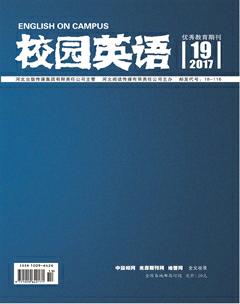英语课堂中语用学委婉语的使用研究
唐诗吟
1. Introduction
In this thesis, it mainly studies High school English teachers use of euphemism in English class from the perspective of pragmatics of politeness principle; the article will expound the function of euphemism between teachers and students in the classroom communication. Politeness is a key factor for communicating smoothly and it can express some nonverbal behaviors. The politeness principle of Leech has six maxims below Leech, P132:
(1) Tact Maxim: Minimize cost to hearer; maximize benefit to hearer.
(2) Generosity Maxim: Minimize benefit to speaker; maximize cost to speaker.
(3) Approbation Maxim: Minimize dispraise of hearer; maximize praise of hearer.
(4) Modesty Maxim: Minimize praise of speaker; maximize dispraise of speaker.
(5) Agreement Maxim: Minimize disagreement between speaker and hearer; maximize agreement between speaker and hearer.
(6) Sympathy Maxim: Minimize antipathy between speaker and hearer; maximize sympathy between speaker and hearer.
It is known that euphemism plays an important role in peoples communication and exists in almost every culture and society. Euphemism derived from the Greek. Its prefix “eu” means good, pleasant and its root “pheme” means speech.
The class communication is a bridge for teachers to expound their views and practice teaching skills. In English class, whether a teacher can master and use communication strategies becomes a determined factor for realization of teaching aims. Due to the certain circumstances, students cognitive ability is not mature enough, so they are sensitive to any teachers words, especially criticism. Thus, teachers should save students faces as far as possible and treat them with the respect. In this way, teachers can more easily gain flavor and respect from their student
2. Case studies
In English class, because the cognitive ability and the affection are different between teachers and students, students may misunderstand teachers meaning beyond the actual words and then feel humiliated and depressed by teachers direct criticism. At this moment, it needs teachers to change his or her way to euphemistically communicate with students.
2.1 Grasp the right sense of criticism
When the teacher criticizes students, he or she should make clear the degree of mistakes. Dont magnify students shortcomings or be too soft on their mistakes. If the teacher criticizes students directly, students will feel frustrated and depressed. Thus, when criticizing students, teachers should not say any bitter words to students. Otherwise, it will cause students psychological inversion.
2.2 Use positive language to represent negative language
Students are more likely to accept pleasant words rather than negative words. If a teacher pays attention to use positive words, students may feel confident and they are willing to listen to the teacher carefully. For instance, a student gives a teacher a wrong answer. Although the teacher does not say any bitter words, it seems that her mute response is criticizing him.
3. Reflections on English learning
According to these pragmatic case studies in English class, it is necessary for English teachers to learn euphemism. Euphemism is not only important in classroom communication but also in daily communications with foreigners. So, how can we use euphemism in our daily life? In some situations, when a person is plain, we cannot directly say “he is ugly.” instead, we can say he has a poor looking or he is plain. In this way, it can make our utterances more decent and polite. After all, the use of euphemism can make us become more native-like, prettify the utterance and moderate our tones during the conversation. Different euphemism contains diverse cultural background, which can help students to thoroughly study English. So, in the future, I want to tell my students that learning English is not just learning its linguistic forms but also the pragmatic functions.
4. Reflections on English teaching
Make a general observation in Chinese English teaching, most of English teachers usually lay the emphasis on the importance of Standard English. They often let students to pay attention to pronunciation rules, vocabulary retention and grammar learning but ignore the learning of euphemism, which causes their students to make an exhibition of themselves during communicating with foreigners. Therefore, it is essential for English teachers to lead euphemism in their teaching, which can make students confident and active in classroom learning. Besides, it is also crucial for Chinese teachers to use euphemism when criticizing students. Chinese English teachers should reflect themselves on this aspect and accumulate the euphemism, which can promote the communication between teachers and students.

